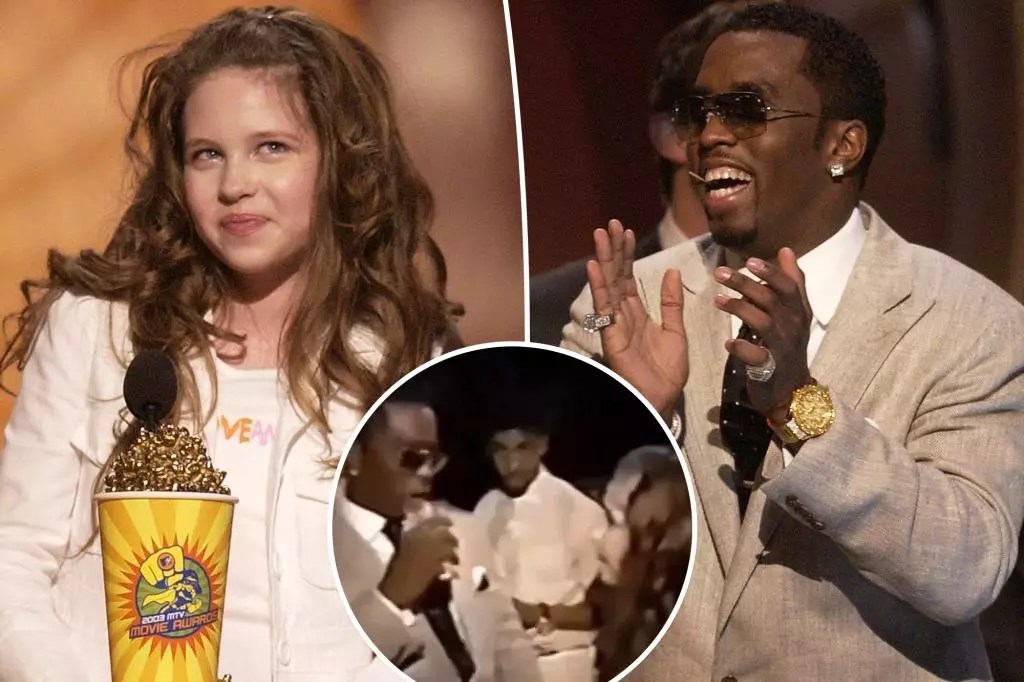A resurfaced video of Sean “Diddy” Combs has reinvigorated public discourse surrounding celebrity culture and its often murky ethical waters. In the footage, taken from the 2003 MTV Movie Awards, a 33-year-old Combs approaches 12-year-old actress Daveigh Chase, inviting her to a party after the ceremony. The casualness with which Combs makes this invitation—while he is visible enjoying a drink—shines a glaring light on the pervasive issue of adult interactions with minors in high-stakes environments. As Combs continues to face serious allegations of sexual misconduct against minors, this clip amplifies concerns about predatory behavior in Hollywood.
The context of this invitation becomes even more troubling when we consider the power dynamics at play. Chase, who won an award for her chilling role as Samara in “The Ring,” was in the spotlight, and Combs stood as an influential figure in the industry. The interplay of celebrity adulation, combined with the apparent carefree attitude surrounding high-profile parties, paints a disturbing picture of normalization regarding inappropriate interactions. Social media users reacted strongly, with many feeling that the joviality shown by Combs was unsettling, especially in hindsight. One comment particularly stood out, stating, “Diddy did all this publicly, imagine what happened behind closed doors,” reflecting a sentiment shared by many.
To fully grasp the implications of this resurfaced video, one must consider the extensive legal challenges Combs currently faces. Following allegations ranging from sex trafficking to assaults on minors, his legacy as a music mogul has grimly shifted into that of a cautionary tale. While Combs has publicly denied wrongdoing, the sheer weight of accusations—over 120 alleged victims, including numerous minors—creates a cloud of suspicion over his public persona.
Amid these serious allegations, the resurfaced footage does more than just spotlight inappropriate interactions; it serves as a reminder of how easily innocence can be exploited, particularly in a glitzy and largely unchecked industry. Chase’s return to the narrative, albeit a reluctant one, amplifies the need to scrutinize the responsibilities of adults in positions of power. No longer is this just a story about a hip-hop icon’s questionable choices; it has escalated into a societal reckoning about how adults treat children in the public eye.
Interestingly, while Combs faces overwhelming scrutiny, the silence or minimized responses from notable figures like Ashton Kutcher—who presented alongside him that night—also warrants examination. Kutcher’s presence at the event and his seemingly friendly interactions with Chase could be interpreted in various ways, yet it leaves an unsettling aftertaste. The specter of complicity looms, as bystanders in such scenarios must reckon with their own responsibilities in addressing inappropriate behavior.
Moreover, the muted response from Chase herself adds another layer of complexity. Having had her own legal troubles in the years since that event, her silence may reflect the heavy toll that fame can take, particularly on young actresses. Living under constant public scrutiny can easily impede one’s ability to engage in open dialogue about predatory behavior, let alone provide comments regarding a high-profile individual like Combs. The cultural atmosphere in Hollywood can inhibit victims and witnesses alike from speaking out, perpetuating a cycle of silence and enabling alleged misconduct to go unchecked.
In examining Sean Combs’ creeping legacy, it’s crucial to note that the viral resurgence of the invitation clip only serves as the tip of the iceberg in a larger conversation surrounding abuse of power in Hollywood. This isn’t just a matter of legal accountability for one man; it extends to how society permits certain behaviors to flourish unchecked among its most celebrated icons.
The public indictment of figures like Combs must challenge us to consider systemic issues within our culture. Why do we allow celebrities to navigate gray areas with impunity, and what structural changes can be made to ensure accountability? As the story continues to unfold, it remains essential for society to foster a culture that prioritizes safety, especially for the most vulnerable members—children.
An invitation to a party may seem innocent, but in the context of allegations facing Combs, it becomes a potent symbol of the need for vigilant societal introspection. The call for accountability and reform strengthens, underscoring that the world of celebrity must evolve, prioritizing the voices and experiences of those who have been silenced for too long.


Leave a Reply